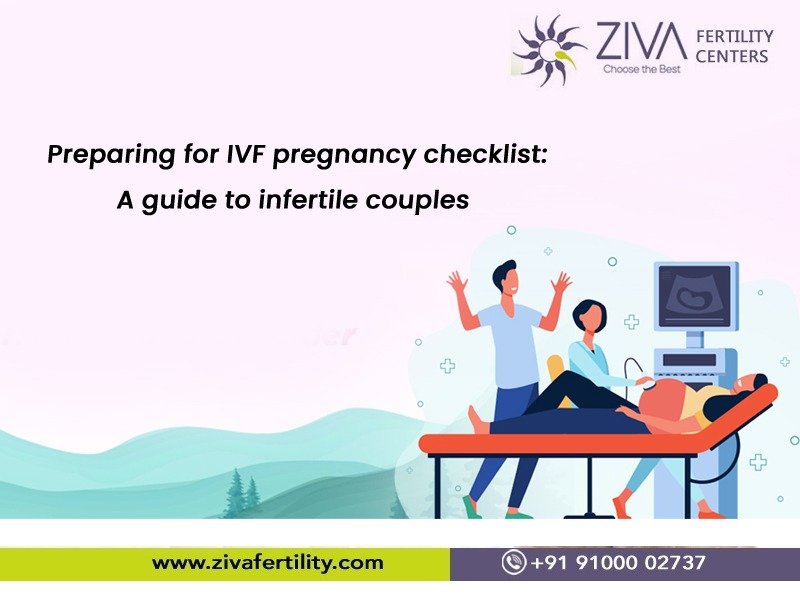Worldwide, In vitro fertilization is the most popular ART chosen by infertile couples to realize their dream of having a baby. All over the world, the awareness of IVF has increased, and in India, IVF clinics are present in semi-urban areas as well. We at ZIVA Fertility Clinics will not directly suggest IVF for you. We will do personal counselling where both the male and female partners are assessed for their chances of conceiving. Even if infertility has been diagnosed, we will get to the root cause of infertility in most cases. At ZIVA Fertility Clinic, we will only recommend IVF after meeting a specific criterion. Our fertility specialists will guide you through every step of this fertility treatment to improve your chances of success.
IVF is a multistep procedure, but a potentially rewarding process for patients who want to conceive. When you undergo this treatment at our ZIVA fertility clinic, you must follow our pre-treatment IVF instructions so that you and your partner are well-prepared for an effective cycle.
Preparing for IVF pregnancy checklist: A guide to infertile couples
Initial consultation: When you come for your initial consultation, we at ZIVA Fertility clinics will ask about your and your partner’s medical history, previous pregnancies, weight, diet, medications, general lifestyle, stress level, previous pregnancy history if any, surgeries, health issues and more. If possible, note them down and come prepared so that you are sure of the answers. Carrying with you your latest lab reports and current medication is advisable. Any of these factors can help our fertility specialists understand all the factors that could influence your treatment and plan accordingly.
Track your ovulation and menstrual cycle: A woman’s menstruation and ovulation largely influence pregnancy. So please track your cycle conscientiously. Maintain your calendar, or some apps help you track the cycle. These apps store historical data as well, which will be helpful to show our ZIVA fertility specialists. There are at-home testing kits to track if you are ovulating regularly. Watch ovulation symptoms informative videos on our youtube channels to note your ovulation day. There are fertility monitors, which is a computerized tool that assesses your spit, urine, vaginal discharge, or body temperature to provide more nuanced information about your cycle.
Pre-IVF tests: Both the male and female partners need to undergo tests before beginning IVF. The testing includes:
Infection tests: Analysis of urine and blood to screen you and your partner for infectious diseases that could be affecting your ability to conceive.
Physical examination of the uterine cavity: The female’s uterine structure is the most crucial part of your ability to conceive, so your fertility specialist will need to examine it for any structural abnormalities through ultrasonography. A sonohysterography is advised if required, which involves taking an ultrasound of your uterus after injecting a saline solution into your cervix. A narrow, lighted tube with a camera at the end is inserted into your uterus through your cervix to capture images of your uterine cavity.
Semen testing: A semen sample is collected from the male partner. A semen analysis is done to check for male infertility issues such as abnormally shaped sperm, a low sperm count, or low motility. This test is advised with a minimum of 3 days and maximum of 7 days of sexual abstinence.
Assessment of reserved ova: Women are born with a full supply of eggs, so the ZIVA fertility specialist will run tests on your reserves to determine how many healthy ova remain, this test is called Anti-Mullerian Hormone test (AMH). Hormone testing or an ovarian ultrasound is done to determine the remaining healthy ova.
Be regular with medications: The process of IVF starts with medications for ovarian stimulation, so the female partner has to take medicines in the form of pills and injections. If you have any queries about the timing or dosage of medications, please freely discuss them with our ZIVA Fertility specialists.
Optimize your health: The general health should be good. So do everything in terms of maintaining your overall physical and mental health, such as:
- Get eight hours per night.
- Quit smoking, and if you are unable to do it on your own, seek the help of professionals.
- Take a well-balanced diet that includes both solids and liquids.
- Cut down on sugar, alcohol, and highly processed foods
- Your fertility doctor may recommend vitamin supplements, so take them regularly.
Find a support system: The IVF process is a long-term procedure that has physical, emotional, and financial implications. Most importantly, the couple should openly communicate with each other and be there for each other. The husband is the best support that the wife can get at this time.
Manage your stress: IVF treatment can be highly stressful, so have a great dialogue with your partner & your healthcare team, voicing any concerns & questions you may have. An experienced psychologist who can deal with infertility patients is advised, and for that matter, any great listener who doesn’t sit in judgement.
We at ZIVA Fertility Centre give a detailed view of your IVF cycle. We set realistic expectations for our couples and hold their hands throughout their IVF journey. For more information, please visit our website https://zivafertility.com/ or contact us at +91-9100002737 or –+91-9347406900
















